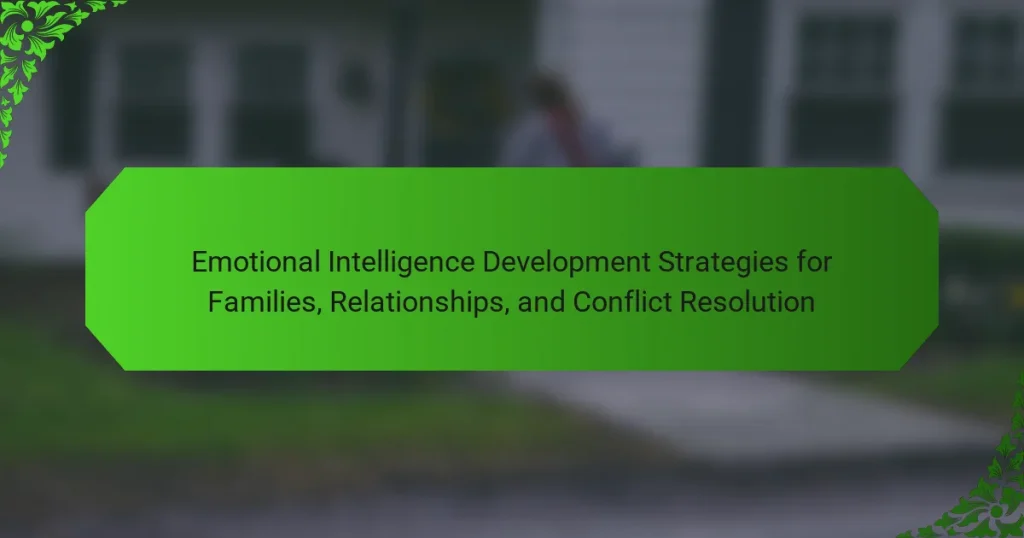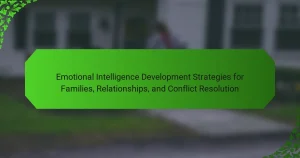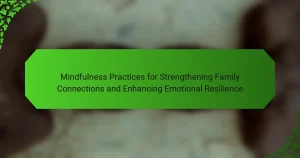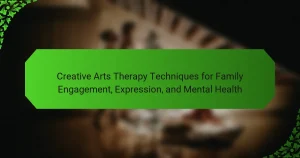Enhancing emotional intelligence is crucial for fostering healthy family dynamics and resolving conflicts effectively. Key strategies include developing self-awareness, practicing empathy, and engaging in open communication. Unique techniques like active listening and emotional validation further improve relational dynamics. Understanding cultural perspectives also enriches emotional intelligence development, leading to stronger connections and better conflict resolution.
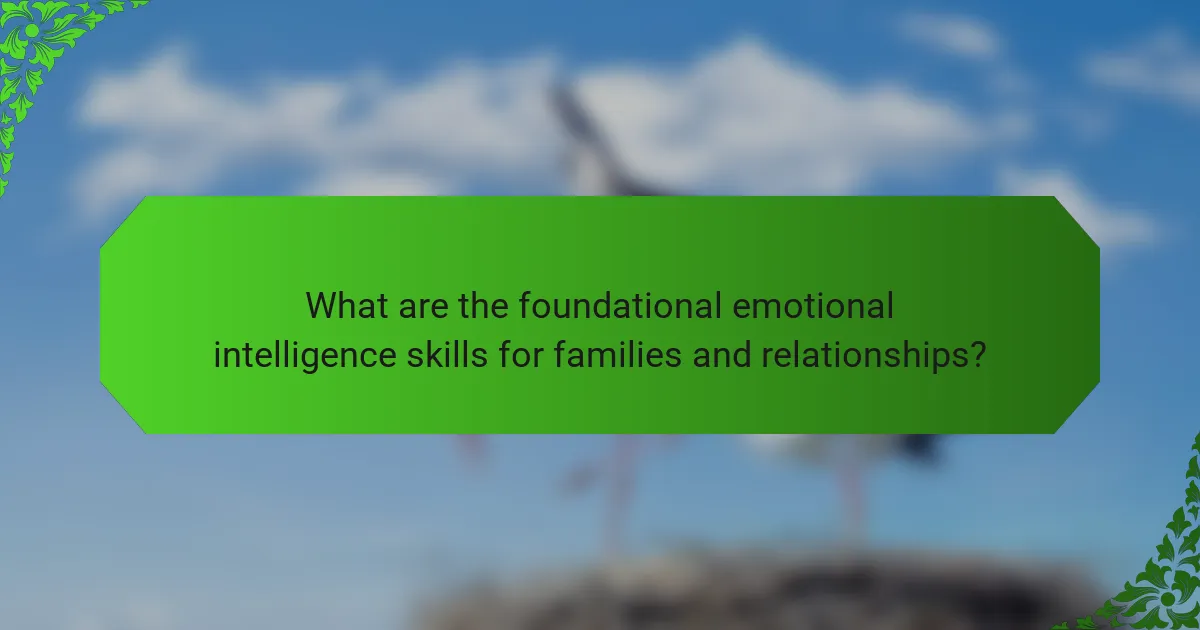
What are the foundational emotional intelligence skills for families and relationships?
The foundational emotional intelligence skills for families and relationships include self-awareness, empathy, effective communication, and conflict resolution. These skills foster understanding and connection, essential for healthy interactions.
Self-awareness allows individuals to recognize their emotions and triggers, enhancing personal growth. Empathy enables family members to understand each other’s feelings, promoting supportive relationships. Effective communication ensures that thoughts and feelings are expressed clearly, reducing misunderstandings. Conflict resolution skills help navigate disagreements constructively, preserving harmony within the family unit.
Developing these skills strengthens bonds and creates a nurturing environment for all members. Investing time in emotional intelligence cultivates resilience and fosters lasting relationships.
How does self-awareness impact family dynamics?
Self-awareness significantly enhances family dynamics by fostering open communication and empathy. It allows family members to understand their emotions and reactions, leading to healthier interactions. Improved self-awareness reduces conflict and promotes collaborative problem-solving, strengthening relationships. Families that prioritise emotional intelligence see increased trust and support among members.
What role does empathy play in resolving conflicts?
Empathy plays a crucial role in resolving conflicts by fostering understanding and connection. It enables individuals to recognize and validate each other’s feelings, which can de-escalate tensions. Empathy also encourages open communication, allowing parties to express their needs and perspectives. As a result, resolutions become more collaborative and satisfying. In families and relationships, practicing empathy can lead to stronger bonds and improved emotional intelligence.
How can emotional regulation improve communication?
Emotional regulation enhances communication by fostering clarity and empathy. When individuals manage their emotions effectively, they can express themselves more clearly and listen actively. This leads to reduced misunderstandings and conflicts. Furthermore, emotionally regulated individuals are more likely to create a safe environment for open dialogue, promoting healthier relationships. Ultimately, emotional regulation is a key strategy in developing emotional intelligence, which is essential for successful family dynamics and conflict resolution.
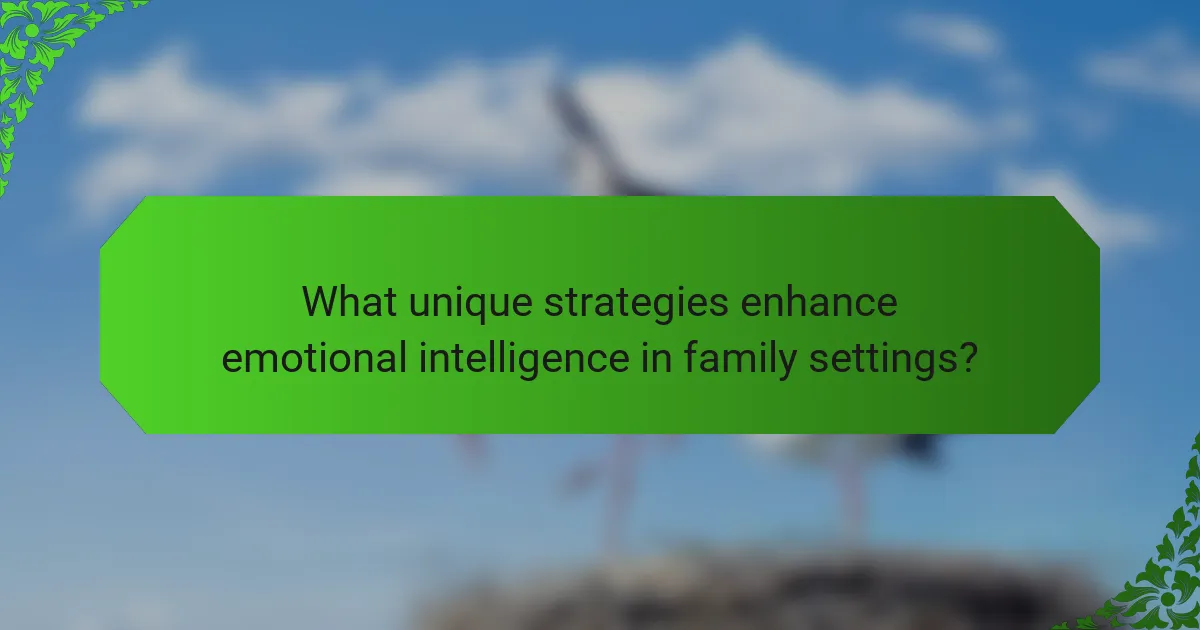
What unique strategies enhance emotional intelligence in family settings?
Unique strategies to enhance emotional intelligence in family settings include fostering open communication, practicing empathy, and engaging in collaborative problem-solving. These approaches cultivate understanding and strengthen emotional bonds. Open communication encourages family members to express feelings without judgment, while empathy allows individuals to connect on a deeper level. Collaborative problem-solving teaches conflict resolution skills and reinforces teamwork, ultimately enhancing emotional intelligence within the family dynamic.
How can storytelling be used to foster emotional connections?
Storytelling fosters emotional connections by enhancing empathy and understanding among individuals. It allows families and relationships to share experiences, creating a sense of belonging. Engaging narratives can evoke emotions, making it easier to navigate conflicts and strengthen bonds. For example, personal stories can illustrate feelings, demonstrating vulnerability and encouraging open communication. This unique attribute of storytelling makes it a powerful tool for emotional intelligence development.
What are the benefits of role-playing in developing emotional skills?
Role-playing enhances emotional skills by fostering empathy, communication, and conflict resolution. It provides a safe space for individuals to explore emotions and practice responses. Engaging in role-playing scenarios allows participants to experience different perspectives, improving their ability to understand others’ feelings. Additionally, it can build confidence in expressing emotions, leading to healthier relationships and effective conflict management. This strategy is particularly beneficial for families, as it encourages open dialogue and strengthens emotional connections.
How can family rituals strengthen emotional awareness?
Family rituals enhance emotional awareness by fostering connection and communication. These practices create a safe environment for expressing feelings. Regularly engaging in rituals, such as family dinners or game nights, encourages sharing experiences and emotions. This consistent interaction strengthens empathy and understanding among family members. As a result, emotional intelligence develops, leading to improved relationships and conflict resolution skills.

What rare emotional intelligence techniques can be applied to conflict resolution?
Rare emotional intelligence techniques for conflict resolution include active listening, reframing perspectives, and emotional validation. Active listening fosters understanding by fully engaging with the speaker’s emotions and thoughts. Reframing perspectives encourages individuals to view the conflict from different angles, promoting empathy. Emotional validation acknowledges feelings without judgment, creating a safe space for open dialogue. These techniques enhance relational dynamics and facilitate constructive resolutions.
How does art therapy facilitate emotional expression in families?
Art therapy facilitates emotional expression in families by providing a safe space for creativity and communication. It encourages members to share feelings through artistic activities, fostering understanding and connection. This approach enhances emotional intelligence, allowing families to navigate conflicts more effectively. Engaging in art therapy can lead to improved empathy and emotional regulation, benefiting overall family dynamics.
What is the impact of nature therapy on emotional intelligence?
Nature therapy enhances emotional intelligence by fostering self-awareness, empathy, and interpersonal skills. Engaging with nature provides calming effects, reducing stress and promoting emotional regulation. Studies show that individuals who participate in nature therapy report higher levels of emotional resilience and improved conflict resolution abilities. This unique approach combines physical activity with mindfulness, allowing families to strengthen their relationships through shared experiences in natural settings.
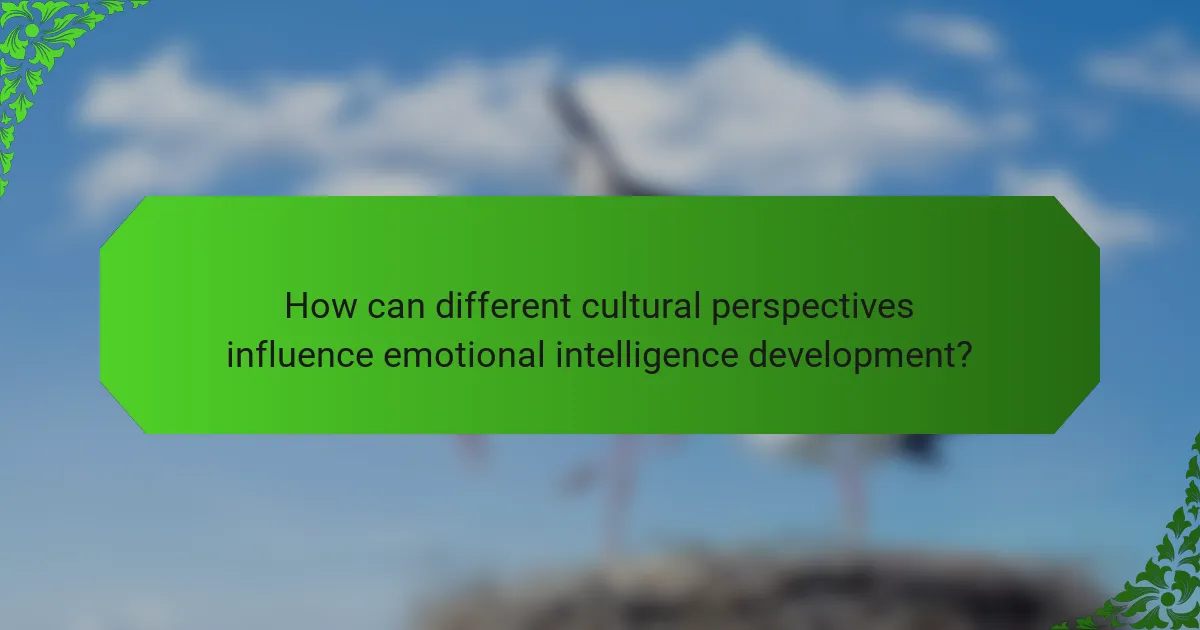
How can different cultural perspectives influence emotional intelligence development?
Cultural perspectives significantly shape emotional intelligence development by influencing communication styles, conflict resolution approaches, and relationship dynamics. Different cultures prioritise various emotional expressions and social norms, affecting how individuals perceive and manage emotions.
For instance, collectivist cultures may emphasize group harmony, encouraging emotional regulation to avoid conflict. In contrast, individualistic cultures might promote self-expression, fostering open communication about feelings. These variations can lead to distinct strategies for developing emotional intelligence within families and relationships.
Additionally, understanding cultural nuances can enhance conflict resolution. Recognising diverse emotional responses allows for tailored approaches that respect cultural backgrounds. As a result, emotional intelligence development becomes more effective when it incorporates these cultural insights, leading to healthier relationships and improved family dynamics.
What are the emotional intelligence practices common in various cultures?
Emotional intelligence practices vary across cultures, emphasizing empathy, communication, and conflict resolution. Common strategies include active listening, non-verbal cues, and community-based discussions. For instance, collectivist cultures often prioritize group harmony, fostering emotional awareness through shared experiences. In contrast, individualistic cultures may focus on self-expression and personal emotional regulation. These practices enhance relationships and resolve conflicts effectively, highlighting the importance of cultural context in emotional intelligence development.
How can multicultural understanding enhance family relationships?
Multicultural understanding enhances family relationships by fostering empathy, communication, and conflict resolution. It encourages family members to appreciate diverse perspectives and cultural backgrounds, leading to stronger emotional connections. Families that embrace multiculturalism often experience improved emotional intelligence, as members learn to navigate differences constructively. This understanding can reduce misunderstandings and promote harmony, ultimately strengthening the family unit.
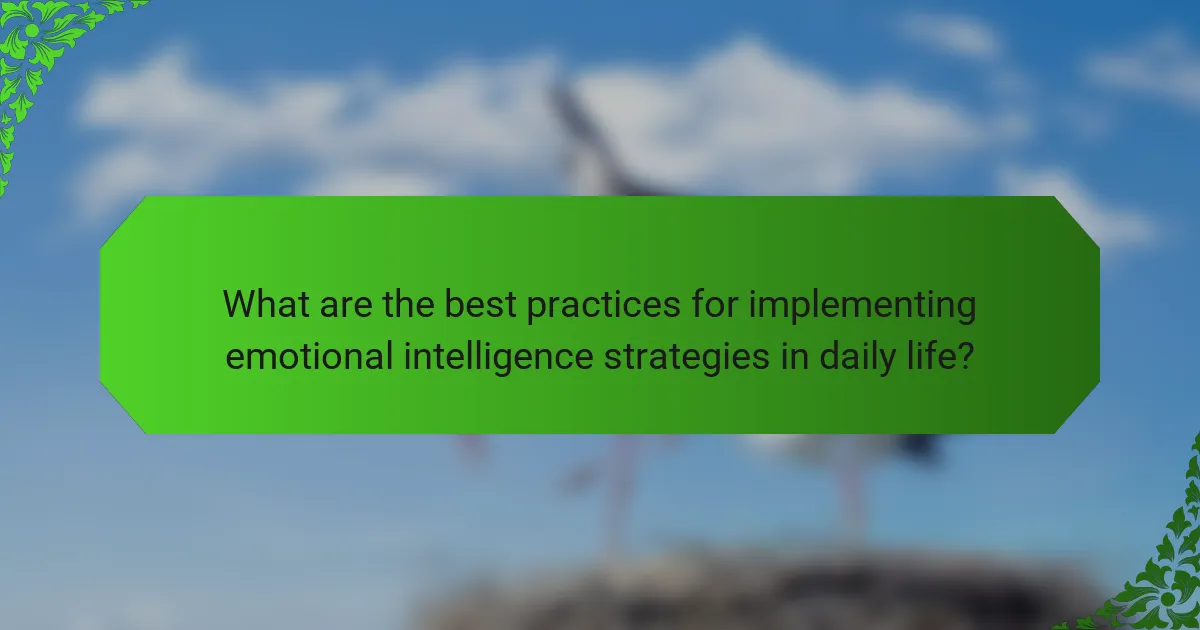
What are the best practices for implementing emotional intelligence strategies in daily life?
To effectively implement emotional intelligence strategies in daily life, focus on self-awareness, active listening, empathy, and conflict resolution techniques. Regular practice of these skills enhances relationships and family dynamics.
1. Cultivate self-awareness by reflecting on your emotions and reactions.
2. Practice active listening to fully understand others’ perspectives.
3. Develop empathy by putting yourself in others’ shoes.
4. Use conflict resolution techniques to address disagreements constructively.
5. Encourage open communication within family and relationships.
6. Model emotional intelligence behaviours to inspire others.
How can families create a supportive environment for emotional growth?
Families can create a supportive environment for emotional growth by fostering open communication and empathy. Encouraging regular family discussions about feelings helps children understand their emotions. Establishing routines that include family activities promotes bonding and emotional safety. Modelling emotional intelligence through examples teaches children how to navigate their feelings effectively. Additionally, providing positive reinforcement and guidance during conflicts enhances conflict resolution skills and emotional resilience.
What common mistakes should be avoided in emotional intelligence training?
Common mistakes in emotional intelligence training include neglecting individual differences, focusing solely on theory without practical application, and failing to measure progress. Additionally, overlooking the importance of feedback can hinder development. Engaging participants in real-life scenarios enhances understanding and retention.
What expert insights can guide families in emotional intelligence development?
Families can enhance emotional intelligence through open communication, modelling empathy, and practicing conflict resolution. Encouraging children to express feelings fosters understanding. Role-playing scenarios can help develop empathy and problem-solving skills. Regular family discussions about emotions create a supportive environment.
